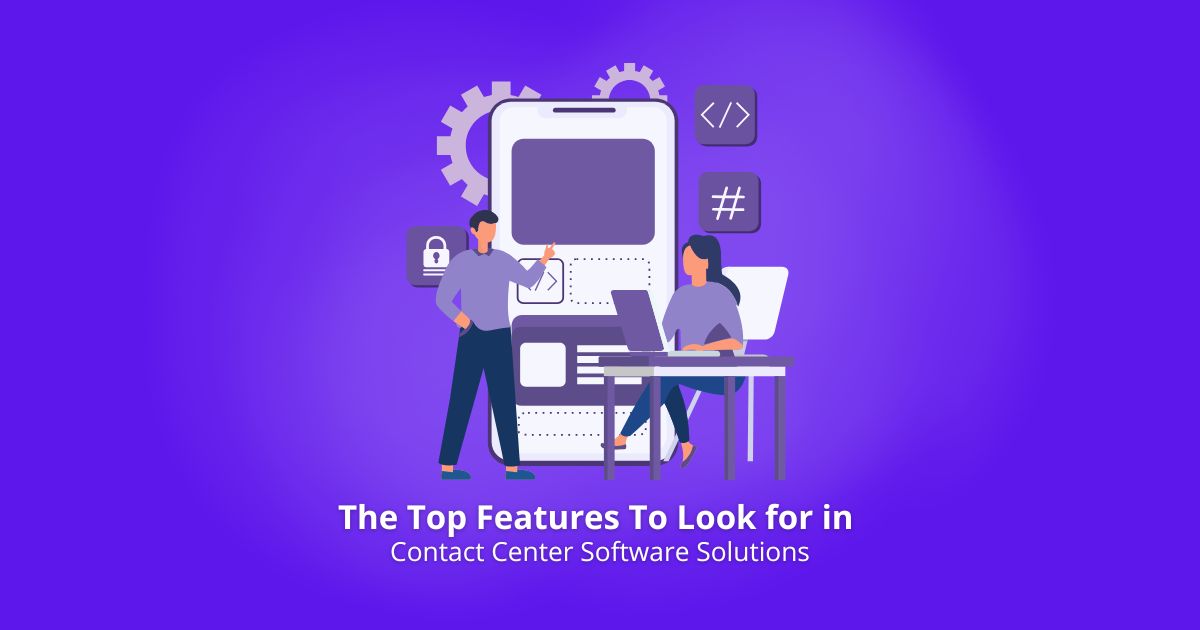The contact center is the heartbeat of customer service, acting as the interface between a business and its clients. In the age of technology, a powerful contact center software solution is vital for handling interactions effectively. The right software can make all the difference in delivering exceptional customer service, maximizing efficiency, and driving business growth.

As such, finding the best software requires an understanding of key features that meet your business’s needs. Below, we delve into the critical features and capabilities that you should consider while choosing a contact center solution.
Essential Features to Look for in Contact Center Software Solutions

When choosing contact center software, it’s essential to consider user-friendliness and reliability. A user-friendly interface can minimize training time and errors, while complex systems can negatively impact customer interaction and business. Flexible call routing and management features ensure agents are sent to the appropriate agents based on factors like skill level, availability, or linguistic competency, improving first-contact resolution rates and customer satisfaction.
Integration with existing CRM systems and databases is crucial for personalized interactions in today’s consumer-centric market. Security and compliance are also crucial, as software must adhere to high-security standards and regulatory compliance to protect sensitive customer information.
How Omnichannel Capabilities Enhance Customer Experience
Omnichannel capabilities in contact center software are crucial for modern consumers who interact with businesses through various channels, including phone, email, live chat, and social media. These capabilities ensure customer information and conversation history are retained across interactions, enhancing satisfaction and loyalty. Omnichannel strategies prevent siloing of communication and provide valuable insights into customer preferences and behaviors.
By tracking interactions across all platforms, businesses can optimize service delivery and tailor communication to better meet customer needs. An omnichannel approach promotes efficiency by streamlining the handling process of queries and issues, enabling faster resolution and personalized service.
The Role of AI and Automation in Modern Contact Centers
Artificial Intelligence (AI) and automation are revolutionizing contact centers by predicting customer inquiries, providing agents with suggested responses, and automating routine tasks. AI-powered chatbots and voice assistants can handle simple tasks, providing immediate responses to customers around the clock. These tools are not meant to replace human agents but to enhance workload management and ensure seamless customer escalates to a human agent when needed.
AI also excels in data analysis, sifting through vast interaction data to uncover trends and insights, optimize strategies, and improve customer satisfaction. Predictive analytics can forecast call volumes, aiding in efficient staffing and resource allocation. AI implementation must be customer-centric, balancing technological efficiency with a personal touch, which is at the core of customer service excellence.
Evaluating the Scalability and Integration Potential of Contact Mary.

When choosing a contact center software, consider scalability and integration potential. Scalability allows for easy addition of users, integration with additional platforms, and increased functionality as businesses expand. Integration potential ensures seamless workflow by connecting with various business tools like email marketing services, productivity apps, and analytics platforms. Consider the cost implications of scalability and integration, as systems that require extensive customization or third-party solutions can lead to increased complexity and costs.
Look for solutions with built-in scalability and broad integration potential without hidden expenses. Consider the vendor’s support and development plans, as regular updates can enhance the software’s value over time, addressing emerging security vulnerabilities and ensuring software evolution with changing technology and industry trends.
The Importance of Robust Reporting and Analytics Tools for Performance Tracking
Effective reporting and analytics are crucial for improving contact center performance. These capabilities provide detailed data on call volume, handle time, resolution rates, and customer satisfaction, enabling managers to make data-driven decisions to enhance efficiency and service quality. Advanced analytics offer deeper insights into agent performance, customer sentiment, and process effectiveness, enabling leadership to identify best practices, training needs, and areas for improvement.
Real-time analytics aid in operational agility, allowing managers to address issues, redistribute resources, and manage workforce to meet contact center demands. Customized reports and dashboards allow businesses to monitor their unique KPIs, aligning with organizational goals and customer expectations.
Altogether, the value of contact center software lies in its ability to transform how businesses engage with their customers, streamline operations, and gain actionable insights into performance. Selecting the right software is paramount, so ensure the features align with your current needs and future goals to foster a dynamic and customer-centric contact center.